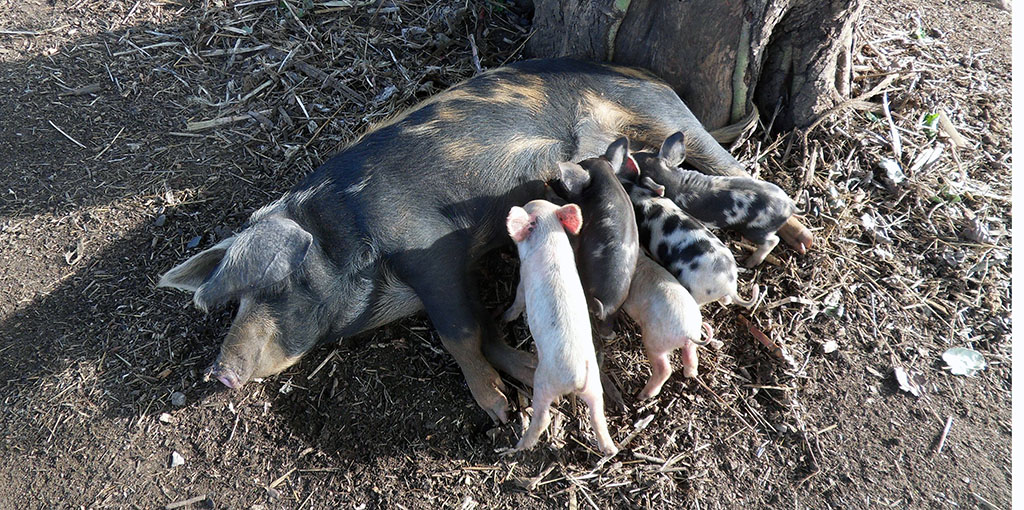Social Sciences have an important role in preventing the spread of African swine fever (ASF). This was one of the key messages from a seminar arranged by SIANI, the National Veterinary Institute and the Swedish University of Agricultural Sciences.
ASF was first described from present day Kenya in a ground-breaking article published in 1921 by veterinarian Eustace Montgomery. A webinar was arranged with the objective to explore the global ASF situation and give an insight into some of the difficulties in controlling the disease, especially in smallholder farm settings.
The event drew a lot of interest with more than 600 registered participants from 70 different countries and more than 380 participants attending the live event. Participants represented public and private sector, research organisations and civil society.
Recent outbreaks in Thailand
ASF is a deadly disease affecting pigs and wild boar. Affected animals get a high fever and may die as quickly as a week after infection. The disease was first described from settlers’ pig farms when Eustace Montgomery worked as a pathologist for the East African Protectorate. He concluded that with precautions, the disease could be avoided. Still, the disease is more present today than ever and spreading rapidly across the world, with recent outbreaks in Italy, North Macedonia, Thailand and Haiti. There is still no cure or vaccine to prevent the disease.
Dr. Mary-Louise Penrith, a researcher from the University of Pretoria in South Africa, highlighted the importance of understanding the human elements in the epidemiology.
“A lot of the research now is focused on the human element in epidemiology of ASF”, she said.
Dr Penrith agreed that the disease is preventable but that new approaches to management are needed to achieve control.
Backyard pigs have an added value
Dr. Klaus Depner, a senior scientific officer in International Animal health at the Fredrich-Loeffler-Institute in Germany, presented his work from smallholder backyard farms in Eastern Europe.
“The pig in the backyard has an added value that is much higher than the market value. This aspect is important and should be taken into account”, he said.
Factors like poor veterinary services, no registration of holdings, home slaughtering and uncontrolled markets contribute to the spread. But he highlighted that it is possible to protect the pigs through measures such as no contact with wild boar and pigs of other farms, no access to animals for visitors, no swill feeding and by not using roughage feed or beading harvested in areas with wild boar.
Participatory epidemiology gives a voice to the rural poor
Dr. Klara Fischer, a researcher at the Swedish University of Agricultural Sciences introduced the audience to participatory epidemiology (PE) and why veterinary science can benefit from collaboration with social scientists. Participatory epidemiology is a method inspired by rapid rural appraisal (RRA) and participatory rural appraisal (PRA) to allow rural poor to influence research and development intervention. She explained how smallholders often do not separate ASF from other problems they face, or even from witchcraft. This has important implications regarding how you communicate about the disease, she pointed out.
“Embracing smallholders’ perspectives is central if we want them to adopt biosecurity measures. We will not find ways to limit the spread of ASF if we don’t find ways to talk about it that are acceptable, comprehended and doable for smallholders. Interdisciplinary research, cross-cultural dialogue and participatory methods are all excellent approaches to opening our eyes to alternative ways of acting”, said Klara Fischer.
Vicious cycle of poverty
Dr. Ayako Ebata, a research fellow and agricultural economist at the Institute for Development Studies (IDS) in the UK, spoke about influencing farmers’ behaviour.
“We know what to do but not how to get there. Complex social systems are guiding individual behaviour”, she said.
She described a vicious cycle of poverty that leads to low investment and high disease risk. To improve the control of ASF and other livestock diseases, Ebata suggests strengthening the veterinary healthcare system, the communication channels on all levels from top to bottom level, and access to credits to increase farmers’ capacity to invest in order to prevent disease. She also suggested working through individuals that are trusted in the community.
To change human behaviour for disease control
Dr. Courtney Price, Lead for Behavioral Science at the UN Food and Agriculture Organization (FAO), gave an insight into behavioural factors and their effects on disease control.
“The human element is more and more highlighted in the discussions around disease control and Covid-19 has made the power of social and behavioral determinants more obvious than ever.”
He pointed out that knowledge transfer rarely changes behaviour on its own.“Pig farmers are people too and we need to work together with them to focus on the knowledge gaps, and to investigate the context around their decisions to see how small changes can enable big changes.”
Speakers were Mary-Louise Penrith, University of Pretoria, Karl Ståhl, National Veterinary Institute in Sweden, Klaus Depner, Friedrich-Loeffler-Institut, Dirk Pfeiffer, City University of Hongkong, Klara Fischer, Swedish University of Agricultural Sciences, Ayako Ebata, Institute of Development Studies, Cortney Price, UN Food and Agriculture Organization. Moderator for the event was Erika Chenais, National Veterinary Institute.
